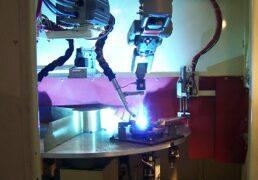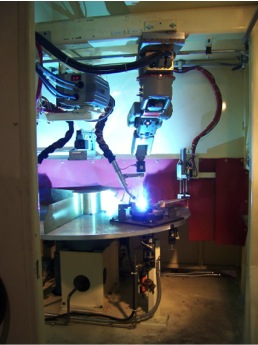Introduction:
As industries evolve, the significance of arc welding machines in ensuring precision, efficiency, and safety becomes increasingly evident. This comprehensive guide delves into the crucial considerations before selecting the ideal arc welding machine manufacturer for your industry. From understanding specific requirements to evaluating reputation, quality, and support services, each facet contributes to the success of your welding operations. Whether you’re a seasoned professional or new to the welding scene, this exploration illuminates the key factors that will elevate your welding endeavors, ensuring you make an informed choice that aligns seamlessly with your industry’s unique needs.
1. Industry-Specific Requirements:
Begin your journey by understanding the unique welding needs of your industry. Assess the materials you’ll be working with, the thickness of these materials, and the preferred welding processes. This foundational knowledge forms the basis for choosing a manufacturer that can cater to the specific demands of your industrial landscape.
2. Research and Reputation:
In the digital age, research is at your fingertips. Dive into reviews, testimonials, and case studies to gauge the reputation of potential arc welding machine manufacturers. A manufacturer with a proven track record and positive industry standing is more likely to provide reliable, durable machines that meet your expectations.
3. Quality and Certification:
Ensure the manufacturer adheres to industry standards and certifications. Look for ISO certifications and compliance with welding quality standards. A commitment to rigorous testing for performance, durability, and safety speaks volumes about the manufacturer’s dedication to delivering top-tier welding machines.
4. Product Range and Customization:
Assess the manufacturer’s product range to ensure they offer welding machines that precisely match your industry’s requirements. The ability to provide customized solutions tailored to your specific welding needs is a hallmark of a manufacturer capable of adapting to your unique operational demands.
5. Service and Support:
The level of customer support and service offered by the manufacturer is paramount. Consider factors such as technical support, training programs, and maintenance services. A manufacturer with a responsive customer service team ensures that any issues are addressed promptly, minimizing downtime.
6. Ease of Use and Training:
User-friendliness is key. Opt for welding machines that are easy to operate, enhancing efficiency and reducing the learning curve for operators. Additionally, inquire whether the manufacturer provides comprehensive training programs for operators, ensuring optimal use of the welding equipment.
7. Warranty and After-Sales Support:
Review the warranty policies offered by the manufacturer. A comprehensive warranty demonstrates the manufacturer’s confidence in the quality of their products. Inquire about after-sales support, spare parts availability, and the manufacturer’s commitment to resolving issues post-purchase for a hassle-free experience.
8. Energy Efficiency:
Consider the energy efficiency of the welding machines. Opt for manufacturers that incorporate advanced technologies to optimize energy usage. Energy-efficient machines not only contribute to cost savings but also align with sustainability goals, making them a smart choice for environmentally conscious industries.
9. Cost Considerations:
While cost is a factor, it should be viewed in the context of overall value. Compare prices across different manufacturers and assess the long-term cost-effectiveness of the machines. A well-balanced approach ensures that you invest in welding machines that deliver both performance and value for money.
10. Global Presence and Local Support:
Consider manufacturers with a global presence if your industry operates internationally. This ensures accessibility to support and services wherever your operations are located. Verify the availability of local representatives or distributors who can provide on-the-ground support for seamless operations.
11. Innovation and Technology Integration:
Assess the manufacturer’s commitment to innovation and staying abreast of technological advancements in welding. Look for features such as digital controls, automation capabilities, and integration with Industry 4.0 technologies. A forward-thinking manufacturer ensures that your welding machines remain relevant in a rapidly evolving industrial landscape.
12. Future Trends and Sustainability:
The future of arc welding machines lies in continued innovation and sustainability. Consider manufacturers who embrace environmentally conscious options, such as biodegradable materials or recycled content. Anticipate advancements in materials, designs, and functionalities that align with the growing demand for sustainable and eco-friendly industrial practices.
13. Industry Experience:
Consider the manufacturer’s industry experience as a pivotal factor in your decision-making process. Arc Welding Machine Manufacturers with a substantial history of supplying welding machines to industries similar to yours bring valuable insights and understanding of the specific challenges and requirements unique to your sector. Experience often translates to a refined product line and a deeper comprehension of the intricacies associated with industrial welding applications.
14. User Feedback and Testimonials:
In addition to general reviews, seek out user feedback and testimonials from industries closely aligned with yours. Real-world experiences provide valuable insights into how well the welding machines perform in actual operational environments. This firsthand information can offer a more nuanced perspective on the manufacturer’s strengths and any potential limitations.
15. Collaboration and Partnership:
Explore the manufacturer’s approach to collaboration and partnership. A manufacturer that views the relationship as a partnership, rather than a transaction, is more likely to be invested in your long-term success. Open communication channels, collaborative problem-solving, and a willingness to understand and address your specific needs are indicative of a manufacturer dedicated to fostering a mutually beneficial partnership.
16. Technological Integration:
Examine the level of technological integration in the welding machines offered by the manufacturer. Industry 4.0 technologies, such as IoT (Internet of Things), data analytics, and connectivity, can significantly enhance the monitoring and control capabilities of welding equipment. A forward-thinking manufacturer that embraces technological advancements ensures that your welding processes remain efficient, adaptable, and at the forefront of industry standards.
17. Reliability and Durability:
Reliability and durability are paramount when it comes to welding machines. Assess the build quality, materials used, and the overall robustness of the machines. Reliable welding machines contribute to consistent and high-quality welds, reducing the likelihood of disruptions and costly downtime. Durability ensures that the machines can withstand the demands of continuous industrial use, providing a reliable and long-lasting solution.
18. Scalability:
Consider the scalability of the welding machines concerning your industry’s growth and evolving needs. A manufacturer that offers scalable solutions enables you to expand your welding capabilities seamlessly as your operations grow. Whether it’s increasing production volume or diversifying welding applications, scalable welding machines provide the flexibility needed to adapt to changing industry dynamics.
19. Comprehensive Training Programs:
The importance of training cannot be overstated. A manufacturer that provides comprehensive training programs for operators ensures that your team is proficient in utilizing the welding equipment to its full potential. Look for manufacturers that offer on-site training, virtual training modules, or access to educational resources. A well-trained workforce not only enhances safety but also maximizes the efficiency of your welding operations.
20. Emerging Market Trends:
Stay abreast of emerging market trends in the welding industry. Manufacturers that actively engage with and respond to these trends are more likely to offer cutting-edge solutions that align with the evolving needs of your industry. Whether it’s the adoption of new welding techniques, materials, or sustainability practices, a manufacturer at the forefront of industry trends positions your operations for future success.
21. Customization for Specialized Applications:
If your industry involves specialized welding applications, inquire about the manufacturer’s ability to provide customized solutions. Some welding projects may require specific features or adaptations to meet unique challenges. A manufacturer that can tailor their welding machines to suit your specialized applications ensures that you have the precise tools needed for optimal performance.
22. Networking and Industry Involvement:
Explore the manufacturer’s involvement in industry networks, associations, and events. Manufacturers actively engaged in the welding industry’s broader community demonstrate a commitment to staying connected with industry developments, standards, and best practices. This level of involvement often translates into a manufacturer that is attuned to the pulse of the industry and is continuously refining its offerings based on industry feedback.
23. Environmental Impact:
Evaluate the manufacturer’s commitment to minimizing its environmental impact. Sustainable practices, eco-friendly materials, and adherence to green manufacturing principles are increasingly important considerations. A manufacturer that prioritizes environmental sustainability aligns with the global push towards responsible and eco-conscious industrial practices.
24. Research and Development Initiatives:
A manufacturer’s commitment to research and development (R&D) initiatives is a telling indicator of their dedication to innovation. Inquire about the manufacturer’s ongoing R&D efforts, as this signifies a proactive approach to staying ahead of industry advancements. Manufacturers invested in R&D are more likely to introduce cutting-edge features, materials, and welding technologies, ensuring that your operations benefit from state-of-the-art solutions.
25. Supply Chain Resilience:
The resilience of a manufacturer’s supply chain is a critical consideration, especially in today’s global business landscape. Inquire about their supply chain management practices, backup plans for disruptions, and the ability to source quality materials consistently. A manufacturer with a robust and resilient supply chain can better navigate challenges, ensuring a continuous and reliable flow of welding machines to meet your industry’s demands.
Conclusion :
In the ever-evolving realm of industrial welding, a holistic approach to selecting an arc welding machine manufacturer involves delving even deeper into critical considerations. The manufacturer’s commitment to research and development, coupled with the resilience of their supply chain, adds layers of assurance to your decision-making process. By incorporating these additional dimensions, you not only secure a reliable supplier but a forward-thinking partner prepared to meet the challenges and opportunities that the future holds for your industry. This comprehensive approach ensures that your chosen manufacturer isn’t just a momentary solution but a strategic collaborator invested in the enduring success of your industrial welding operations.
























































